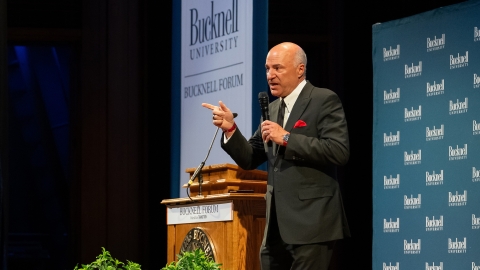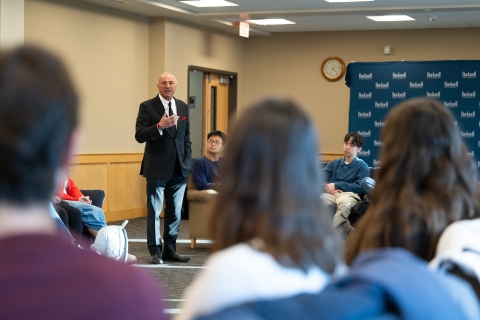
Entrepreneur and Investor Kevin O'Leary Shares How to Succeed in Business
February 19, 2025
Investor and Shark Tank host Kevin O'Leary spoke about business and entrepreneurship at the Bucknell Forum. Photo by James T. Giffen, Marketing & Communications
On the surface, Shark Tank is precisely what it appears to be: a reality television series where ambitious entrepreneurs pitch their big ideas to a panel of potential investors with the hopes of making it big.
However, the show's impact exceeds far beyond the reach of its 42-minute runtime. "Think about 17 years of pitches on Shark Tank," said Kevin O'Leary, one of the proverbial sharks who has been with the show since its premiere in 2009. "It shows in 54 countries in almost every language in the world." The show's influence lies not in the products and services it brings to life, O'Leary argued, but in its ability to "export the American Dream."
As the fourth speaker in Bucknell's 2024-2025 Forum series, which is focused on the theme "World in Transition," O'Leary shared his insights into the rapidly evolving business landscape while also offering tips on how to transform good ideas into successful businesses. Following a private question-and-answer session with students, he delivered a keynote address on Feb. 18 to a full house in the Weis Center for the Performing Arts.

Kevin O'Leary attended a question-and-answer session with Bucknell students before delivering his keynote address at the Bucknell Forum. Photo by James T. Giffen, Marketing & Communications
The chairman of O'Shares Investments and Beanstox, O'Leary holds investments in over 50 private venture companies across every sector of the economy. Along with contributing to CNBC, ABC News and Good Morning America, he is the author of three New York Times best-selling books: Cold Hard Truth, Men, Women and Money, and Family Kids and Money. Though it is perhaps his role as a host of the five-time Emmy Award-winning programs Shark Tank and Beyond the Tank, which have earned the investor and self-styled "Mr. Wonderful" world renown.
While undoubtedly a source of entertainment and, perhaps even inspiration, to millions, O'Leary said that Shark Tank's greatest source of value stems from its capacity to provide real data about why some startups succeed and others fail. With 16 aired seasons of data on his hands, including thousands of pitches and a variety of successful startups that have since become household names — such as Kodiak Cakes, Scrub Daddy and Bombas socks — O'Leary has derived new insights from his investments. "In my experience, of all these deals I've done over the years," he said, "over 90% of our successes to return capital have come from companies run by women."
In an empirical study of companies within his portfolio, O'Leary found that women set lower, more attainable sales growth targets than men, creating a "winning culture" that virtually eliminated employee turnover. More than being an interesting data point, O'Leary quickly leveraged these insights into guidelines for how other leaders should run their companies. "When we discovered this data, we held a conference," he said. "We said to everybody, 'lower your targets. We're not after growth targets you can't hit.' And within two years, cash flow started to go up."
During the question-and-answer portion of the event, Lyric Abdul-Rasheed '26, chemical engineering, herself a budding entrepreneur, asked O'Leary about what he'd learned from his mistakes. "People make mistakes, and then this thing starts to emerge called intuition," he said. "Intuition is actually experience." It's the gut feeling you get when trying to decide if you're making the right decision. "It turns out that, in your career, it's the opportunities you say no to that end up being more valuable than the ones you say yes to."
Of course, O'Leary understood that among his audience were droves of young entrepreneurs hoping to one day get the "yes" that could launch their ideas into businesses and careers, so he offered three common attributes that he'd found in all successful Shark Tank pitches.
"Number one: Are you able to articulate the opportunity in 90 seconds?" said O'Leary. "You have to be able to articulate the idea — crystal clear — real fast."
Secondly, entrepreneurs need to demonstrate that they can transform an idea into a functioning business. "Everybody's got a great idea, but what they don't have is executional skills," he said. "Because a great idea without the ability to execute on it is practically worthless. So number two: What is it about you that can take this great idea and make it happen?"
Finally, O'Leary shared, "You have to know your numbers." It all comes back down to data. What separates a good idea from a successful one — the kind that catches and keeps the attention of the sharks — is a deep knowledge of the market. "How big is the market? How fast is it growing? What's the break-even analysis? How many competitors are there?" he said. "You get these three right, and your chances of winning over an investor go up geometrically, proven by 17 years of data."
Winning over an investor is about more than the pursuit of money. "For me, entrepreneurship and the freedom it gives is the essence of life," said O'Leary. Amidst the tumult of shifting political administrations and rapidly evolving technologies, he argues that entrepreneurship is the lifeblood of the economy. "Everybody has an opinion, whether you're Republican or Democrat, but job creation is bipartisan," he said. "Everybody wants to create jobs, and that's what we must protect in our politics: the ability to keep fueling the American dream."

